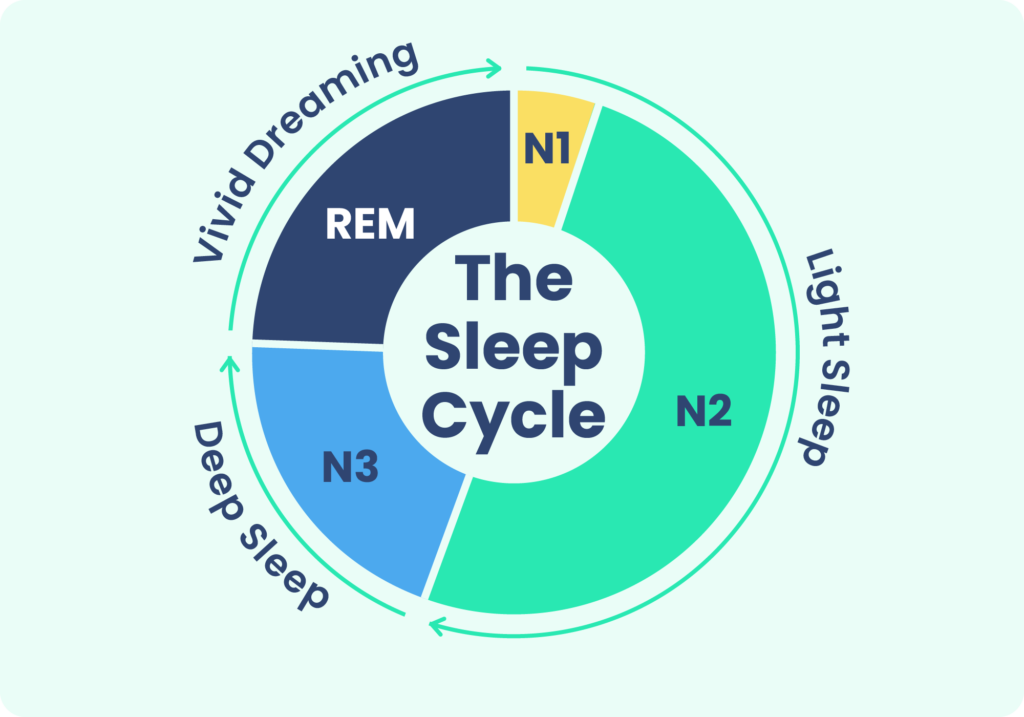A feeling of a lack of mental or physical energy
Fatigue – Affecting both body and the mind, fatigue can be caused by a number of factors including irregular or lack of sleep.
True or False: During sleep, your brain rests.
False
Sleep Fact: Your brain stays active during sleep doing important tasks such as brain reorganization, toxic waste removal, memory consolidation, and neuroprotective benefits.
List 2 relaxation techniques that can help with sleep.
Deep Breathing, Meditation, Stretching/Yoga, Progressive Muscle Relaxation, Visualization, etc.
a sleep disorder that makes people feel excessively tired during the day despite getting an adequate amount of sleep.
Narcolepsy
What is something physical you can do to improve sleep?
Stretching, Yoga, Meditation, and Exercise!
The body’s approximately 24-hour internal clock that helps coordinate the timing of a wide range of physical and mental functions, including sleep.
Circadian rhythm – Affecting bodily functions including sleep, hormone release, temperature, and appetite.
True or False: Naps should be taken in the early afternoon and be no longer than 45 minutes.
True
Sleep Fact: Long naps can be bad for you because they can increase your risk of health problems like heart disease, diabetes, and high blood pressure. They can also cause temporary grogginess and interfere with cognition.
List two things to avoid before bed.
Sugar, caffeine, electronics, alcohol/substances, unhealthy foods, etc.
A condition that causes a very strong urge to move the legs, and difficulty keeping asleep.
Restless Leg Syndrome
Name what kind of foods you should NOT eat before bedtime.
Unhealthy foods, sugar and fat-filled foods, spicy foods, and two hours before bedtime it's suggested to not eat any food!
A hormone produced by the body that helps to regulate circadian rhythm and sleep.
Melatonin
Fun Fact: The pineal gland in the brain produces melatonin in response to darkness.
True or False: Not getting enough sleep can impact your immune system
True
Sleep Fact: Not getting enough sleep can negatively impact your immune system. This can make you more susceptible to illness, and can increase your risk of developing inflammatory disorders and cardiovascular disease.
List 2 things that make a good sleep environment.
Quiet, dark, cool, consistent schedule, electronics turned off/placed away from bed, etc.
Unusual behaviors during sleep, such as sleepwalking, talking, or eating.
Parasomnia
Setting alarms, writing in a schedule, and being consistent are all part of what sleeping technique?
Following a sleep routine!
Sleep Tip: Go to bed and wake up at the same time every day, including weekends.
A sleep disorder that can be characterized by trouble falling asleep, waking up in the middle of the night, or waking up too early.
Insomnia - At least 10% of the adult population have chronic insomnia.
True or False: The older you get, the fewer hours of sleep you need.
False
Sleep Fact: The need for sleep remains constant throughout adolescence. Although adults may wake up more often at night and have a lower sleep time, their sleep needs are at least as much as during adulthood.
What kind of light do Tv's, phones, and computers emit that decreases sleep when absorbed at night.
Blue light
Sleep Fact: Blue light decreases melatonin production, which can make it harder to fall asleep. This is because blue light tricks the brain into thinking it's daytime, which stops the body from releasing melatonin.
A sleep disorder where breathing is interrupted repeatedly during sleep.
Sleep Apnea
How long before bed should you limit your use of electronics such as TV, computers, and phones?
At least 30 minutes before bedtime.
List one of the two different phases of the sleep cycle (commonly known in their abbreviated forms).
Non-rapid eye movement (NREM) sleep: The first part of the sleep cycle, which is the deepest sleep and makes up about 75% of sleep.
Rapid eye movement (REM) sleep: The second part of the sleep cycle, when the eyes move rapidly behind closed eyelids. REM sleep is also known as dream sleep.
How many sleep cycles do you experience in one night?
People typically have four to six sleep cycles per night.

What are some kinds of teas that are known to help with sleep.
Chamomile, lavender, valerian, lemon balm, passion flower, and peppermint.
Sleep Fact: Chamomile contains apigenin, an antioxidant that may have a sedative effect.
A condition that causes temporary muscle weakness and hallucinations when falling asleep or waking up.
Sleep paralysis
This is an important thing you should soak up 5 to 30 minutes after waking up.
Sunlight!
Sleep Tip: Sunlight is packed with Vitamin D which assists in improving mood and helping to keep your circadian rhythm on track!